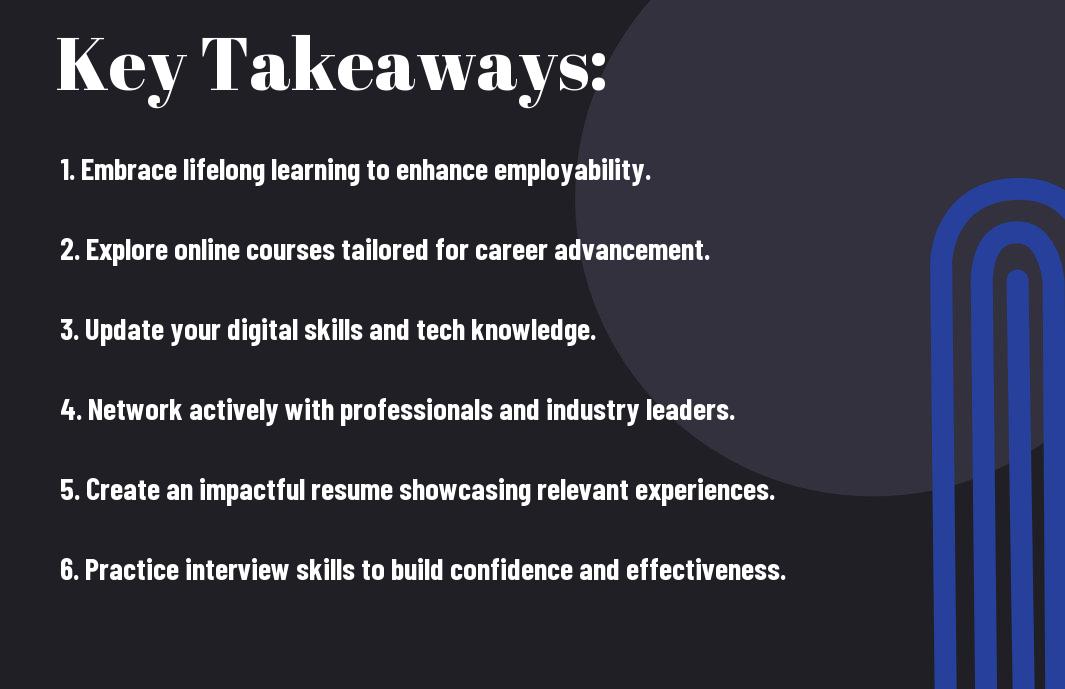The Essential E-Learning Steps For Jobseekers In Their 50s - A Roadmap To Employment

Just like any successful journey, navigating the job market in your 50s requires a clear roadmap. This blog post will guide you through vital e-learning steps designed to enhance your skills and increase your employability. You will discover how to leverage online resources to boost your knowledge, adapt to modern work environments, and showcase your experience effectively. By following this roadmap, you can turn potential challenges into opportunities and confidently step into your next career phase.


Understanding the E-Learning Landscape
A comprehensive understanding of the e-learning landscape is important for effective job searching, especially for those in their 50s. This modern educational method blends technology with learning to provide flexible and accessible skill development opportunities tailored to your needs.
Defining E-Learning
Around the globe, e-learning refers to the use of electronic technologies to access educational content outside of a traditional classroom. This learning model enables you to engage in courses or training programs at your own pace, making it a versatile option for adults re-entering the job market.
Importance of E-Learning for Jobseekers in Their 50s
Along your journey to regain employment, e-learning is invaluable as it allows you to acquire new skills, stay updated with industry trends, and enhance your resume effectively. In a rapidly evolving job market, being proactive in your education is important for staying competitive.
A significant factor in choosing e-learning is the accessibility it provides. By allowing you to learn from home or anywhere, it accommodates your schedule better than traditional educational settings. Investing in e-learning opens numerous opportunities, enabling you to familiarize yourself with the latest technologies and methodologies pertinent to your field.
Types of E-Learning Platforms
Defining the types of e-learning platforms available can significantly guide your decision-making process. Here's a breakdown of popular options, highlighting their unique features:
| Platform Type | Description |
| Online Courses | Self-paced, structured courses on various subjects. |
| Webinars | Real-time sessions with industry experts for interactive learning. |
| Learning Management Systems (LMS) | Comprehensive platforms for managing and tracking learning progress. |
| Mobile Learning | Learning accessible on mobile devices for on-the-go convenience. |
| Microlearning | Short, focused content for quick skill upgrades. |
Due to the various formats available, you can choose what best suits your learning style and schedule. Being aware of these options will empower you to take charge of your professional development.
The types of e-learning platforms offer diverse opportunities for your personal and professional growth. Consider the following as you explore further:
- Online Courses: Encompasses a range of subjects for flexible learning.
- Webinars: Facilitate real-time engagement with experts.
- LMS: Comprehensive tools to track your learning progress.
- Mobile Learning: Takes learning to your fingertips.
- Microlearning: Short bursts of knowledge to fit into your busy schedule.
This variety ensures that you have the tools and resources necessary to refine your skills and prepare for your next career step effectively.
Assessing Skills and Career Goals
It is important to take stock of your skills and career objectives as you navigate the job market in your 50s. By understanding where you stand and where you want to go, you create a solid foundation for your job search. This chapter will guide you through the important steps of assessing your skills and aligning them with your career aspirations.
Conducting a Personal Skills Inventory
About assessing your personal skills inventory means reviewing the skills you have acquired throughout your career. This includes technical skills, soft skills, and any certifications you may hold. Take time to list these competencies and recognize their significance in your future job endeavors.
Identifying Transferable Skills
Along the way, identifying transferable skills is vital to your job search strategy. These are skills that can be applied in various industries and roles, making you a valuable candidate no matter the field. Whether it's leadership, communication, or problem-solving, pinpointing these abilities can open up new professional avenues for you.
For instance, if you have spent years managing teams, your leadership and interpersonal skills can be valuable in various environments, such as project management or sales. Highlighting these transferable skills in your resume and interviews will demonstrate your flexibility and adaptability to potential employers.
Setting Realistic Career Aspirations
Conducting research to set realistic career aspirations helps you align your skills with the job market. By understanding industry trends and the demands of potential employers, you can adjust your goals to create a feasible career plan that suits both your experience and aspirations.
Realistic career aspirations should be based on both your interests and the realities of the job market. Aim for positions that not only excite you but also are in alignment with your current skill set. This approach ensures that you remain competitive while pursuing rewarding opportunities that fulfill your professional ambitions.
Choosing the Right E-Learning Courses
Many jobseekers in their 50s find themselves at a crossroads, and choosing the right e-learning courses can significantly impact your journey back into the workforce.
Researching Course Providers
Among the many challenges you face, finding reputable course providers is important to ensure you invest your time and money wisely. Look for platforms that have strong testimonials, credentials, and a solid track record in delivering meaningful courses.
Evaluating Course Content and Outcomes
Beside provider research, it's important to analyze the course content itself and the potential outcomes. This will help you gauge whether the skills taught align with the positions you're aiming for.
To effectively evaluate course content and outcomes, take the time to review the syllabus, and consider how well the material relates to your desired job role. Ensure that the courses offer practical, hands-on experience and cover trending tools or methodologies in your industry. It's beneficial to check if the program provides certifications or recognizable qualifications that could enhance your resume, making you a more attractive candidate to employers.
Considering Time Commitment and Flexibility
Any successful learning experience requires you to consider the time commitment and flexibility offered by the course. Make sure that the program fits into your existing schedule so you can complete it without feeling overwhelmed.
Another beneficial aspect to consider is your learning style and how the course structure accommodates it. Some courses may offer asynchronous learning, allowing you to study at your own pace, while others may require attending live sessions. Balancing your personal and professional life with your coursework can enhance your retention and success, so choose an option that aligns with your lifestyle and availability.
Developing a Learning Plan
Keep your focus sharp as you create a structured approach to your e-learning journey. Your learning plan should guide you through the process, making it easier to identify the skills needed to successfully transition into a new job. This roadmap will keep you on track and motivated as you progress.
Setting Specific Learning Objectives
Above all, you need to define clear, measurable goals that align with your career aspirations. Specific learning objectives provide direction and motivation, enabling you to concentrate on acquiring the skills that matter most for your desired role.
Creating a Study Schedule
On the next step, it's necessary to develop a study schedule that accommodates your existing commitments while allowing dedicated time for learning. Incorporating regular study sessions into your routine will foster consistency and ensure steady progress.
And, crafting a study schedule involves assessing your current availability and pinpointing ideal times for learning. It's beneficial to allocate specific days and hours each week for your studies. Be realistic about your time limits, and include breaks to avoid burnout. By adhering to your schedule, you establish a healthy learning rhythm that contributes to your success.
Incorporating Feedback and Assessments
Behind every successful learner is a commitment to evaluation and improvement. Actively seeking feedback and participating in assessments will help you gauge your understanding and refine your skills as you progress through your courses.
At this stage, request feedback from peers, instructors, or mentors who can provide insights on your performance. Engage in self-assessments to monitor your growth, identifying areas where you excel and where you may need further development. This iterative process will allow you to strengthen your skillset and increase your confidence as you prepare for the job market. By embracing feedback, you position yourself for continuous improvement and better employment opportunities.
Navigating Technological Challenges
Now, as you commence on your e-learning journey, it's imperative to navigate the technological challenges that may arise. Familiarizing yourself with these aspects will empower you and ease your transition into the digital landscape of job-seeking and professional development.
Basic Tech Skills for E-Learning
Skills such as operating a computer, navigating the internet, and using common software like email and word processors are fundamental for successful e-learning. Having a solid grasp of these basic tech skills will enable you to engage with online platforms effectively and access the resources you need.
Overcoming Common Barriers to Learning
Learning new technologies can be daunting, especially if you feel overwhelmed by the pace of change. It's important to approach this with a mindset of exploration and curiosity, allowing yourself to make mistakes and grow from them.
Tech-savvy individuals often forget that learning new technologies is a process that requires patience and practice. You may encounter barriers such as unfamiliar software or intimidating jargon, but these challenges can be overcome. Consider setting small, achievable goals for each learning session. This will help build your confidence and keep you motivated as you gain new skills.
Utilizing Online Support Resources
At your disposal are various online support resources that can enhance your learning experience. Engaging with video tutorials, forums, and e-learning communities can provide you with the assistance you need.
Indeed, many websites offer step-by-step tutorials tailored for beginners, which can help demystify technology for you. Online forums and support groups can also be invaluable, allowing you to connect with others who face similar challenges. Don't hesitate to reach out; this supportive network can provide practical solutions while fostering an encouraging learning environment.
Networking and Community Engagement
Not only is networking crucial for expanding your job opportunities, but it also provides an avenue for professional development and personal growth in your 50s. Engaging with others in your field can open doors and lead to potential job offers, collaborations, or mentorships.
Building an Online Professional Network
Any effective job search strategy includes building an online professional network. Start by updating your LinkedIn profile, highlighting your skills and experience. Connect with former colleagues, industry professionals, and potential employers to create a diverse network that supports your job-seeking efforts.
Joining E-Learning Communities
One of the best ways to stay informed and connected in your industry is by joining e-learning communities. By participating in online forums, webinars, and workshops, you can engage with like-minded individuals and industry experts who can provide valuable insights and advice.
It's important to actively participate in these communities by asking questions, sharing your experiences, and contributing to discussions. This involvement not only deepens your knowledge but also helps you establish yourself as a thought leader in your field, making you more visible to potential employers.
Leveraging Social Media for Job Opportunities
Media platforms can serve as a powerful tool for discovering job opportunities. Use Twitter, Facebook, and LinkedIn to follow industry leaders, companies, and job boards, creating a personalized feed of posts and updates relevant to your job search.
Social media allows you to engage directly with organizations, inquire about job openings, and learn more about company culture. By sharing your expertise and participating in industry conversations online, you position yourself as a knowledgeable candidate eager for new opportunities. Just be cautious in your interactions to maintain a professional image and avoid any posts that could undermine your job search efforts.
Job Search Strategies Post-E-Learning
After completing your e-learning courses, it's time to implement job search strategies that maximize your new skills and knowledge. With a targeted approach, you can significantly enhance your chances of landing a job in your 50s.
Crafting a Targeted Resume
Strategies for creating a targeted resume involve focusing on specific job descriptions, tailoring your experience to match the required skills, and highlighting any relevant e-learning courses you've completed. This personalized approach demonstrates your commitment and adaptability, making your resume stand out.
Preparing for Interviews
Preparing for interviews requires you to develop a deep understanding of the company, its culture, and the specific role you are applying for. This preparation allows you to formulate thoughtful questions and articulate how your unique background and skills will benefit the organization.
The key to successful interview preparation is practice. Engage in mock interviews with friends or use online platforms to simulate the interview environment. This will help you articulate your experiences confidently. Articulate your strengths and how they relate to the job, ensuring to convey your enthusiasm and willingness to contribute effectively to the team.
Using Job Boards and Recruiters Effectively
Before plunging into job boards and connecting with recruiters, identify the key platforms that align with your industry and career goals. Tailor your profile and applications to reflect your unique qualifications and the skills gained through e-learning.
Search for roles on platforms such as LinkedIn, Indeed, and specialized job boards relevant to your field. Engage with recruiters who specialize in your industry, and consider setting job alerts to stay informed about new opportunities. Don't hesitate to reach out directly to recruiters, expressing your interest in relevant positions to get your foot in the door.
Conclusion
From above, you now have a clear roadmap that can guide you through the e-learning steps important for securing employment in your 50s. Embrace the opportunities to upskill, network, and tailor your resume to match today's job market.
Consider exploring programs like this:
- A 50+ Jobseeker Footprint 👣 (E-book version) will provide valid insight into the pathway for transitioning from jobseeker to a new career,
This comprehensive approach will equip you with the tools needed to navigate your career transition effectively.

